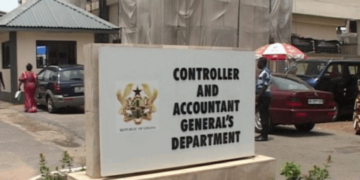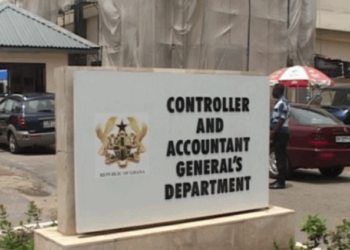Dr. Mohammed Amin Adam, Member of Parliament for Karaga and Deputy Minister for Energy, has allayed Ghanaians’ concerns over the Minority’s accusation that the government has lost control of the country’s debt crisis.
Dr. Amin Adam stated that the causes for the growth in the national debt were well-known problems originating from the NDC’s carelessness while in control of the economy. These elements were the cleanup of the banking sector and the payments made to the energy industry.
He added that when the NPP took over the country, the banking sector was in disarray.
The DKM crisis had recently happened in 2016, and after an Asset Quality Review exercise, 9 banks were discovered to be undercapitalized, with toxic balance sheets contributing less credit to the private sector.
The government began a clean-up operation in 2017, resulting in a GHS 21.5 billion debt expenditure to safeguard depositors.
“Similarly, the energy sector liabilities had crystallized with a liability of almost US$ 1.0 billion per annum, with securitised amounts on the debt stock rocketing to about GHS 12.9 billion. We had to put in place an energy sector stability plan, which includes an additional US$ 1.0 billion of the 2020 Eurobond dedicated to refinance and renegotiate some IPPs to bring sanity to the sector.”
“Also, due to the effects of COVID-19, the size of the GDP did not grow, as growth was just about 0.9%. These factors led to an increase in the Debt-to-GDP from 61% in 2019 to 76% in 2020.”
Dr. Amin told the media in Karaga after handing 20 motorcycles to farmer groups that the government has implemented a solid debt management plan to limit the pace of debt accumulation.
He said that a close examination of the economic foundations of the 2022 budget reveals that the government is motivated to contain debt buildup and manage the cost and risks associated with the country’s indebtedness.
“The primary balance is an important indicator of debt accumulation. It is defined as government revenue less non-interest spending. It is a measure of the domestic fiscal effort of the government. When it is negative, it means increasing debt accumulation and the reverse is true. In 2020, the primary balance was negative 4.6% of GDP. In 2021, it was negative 2% of GDP.”
“In the 2022 Budget, the primary balance is projected to be a surplus of 0.1% of GDP indicating that the revenue measures provided by the Budget will generate more revenue, whilst expenditure is controlled.”
Dr. Amin Adam also said that the total fiscal balance is a helpful signal for the government when it comes to controlling the country’s debt load.
“Another good indicator is the overall fiscal balance. The economy recorded a fiscal deficit of 11% of GDP in 2020, which reduced to 7.7% of GDP in the first half of 2021; and is projected in the 2022 budget at 7.4% of GDP. The rate of inflation has also got implications for debt management. Lower inflation ensures that domestic long-term debts are stable. In the 2022 budget, the government will ensure that inflation is reduced from 11% by the end of October 2021 to a single digit of 8% by the end of December 2022.”
“It is also important to examine the effectiveness of the government’s debt liability management. Our very recent economic history shows that both the cost and risk of borrowing have seen significant improvements. For example, the weighted average interest rate has been stable over the last 4 years, whilst the Average Time-to-Maturity has increased from 9 years in 2016 to 15 years in 2021.”
He thus appealed to the good people of Ghana to continue to support the government as it transitions to recovery from the effects of COVID-19.
He was optimistic about the recovery, pointing out that the GDP growth rate had increased from 0.9 percent in 2020 to 3.5 percent in the first half of 2021, with a projected increase to 5.8 percent in 2022.
Read Also: Parliament ‘fights’ Ofori-Atta over financial allocation to the House
SOURCE: CITINEWSROOM


























